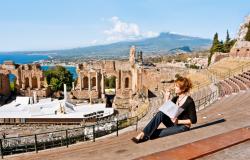Words by Pat Eggleton
“Oh, it was nothing special – just a family meal”, said my friend Gina’s mother-in-law when I thanked her for a Christmas lunch at which she had served ten different dishes. She was being modest, of course, but there was also some truth in the statement. Christmas lunch in Sicily is special but really it is an extended version of the meal that the materfamilias produces every Sunday.
 Italian women do not panic at the prospect of hosting the main festive meal nor do they fight over the last turkey at the supermarket. Women’s magazines in Italy are not, at this time of year, full of advice on “how to survive the family” because the family is not regarded as something which has to be endured. It is, rather, the most important part of most Italians’ lives and at festival time everyone, from the oldest “ nonna” [grandmother] to the youngest toddler, helps with the preparation of the meal for relatives from near and far.
Italian women do not panic at the prospect of hosting the main festive meal nor do they fight over the last turkey at the supermarket. Women’s magazines in Italy are not, at this time of year, full of advice on “how to survive the family” because the family is not regarded as something which has to be endured. It is, rather, the most important part of most Italians’ lives and at festival time everyone, from the oldest “ nonna” [grandmother] to the youngest toddler, helps with the preparation of the meal for relatives from near and far.
The men, for instance, are particularly discerning shoppers and have the knack of turning up at a bakery just as the new bread delivery does so bread is always bought fresh. There is an elderly gentleman in my street who goes out every morning at eleven and comes back carrying a package and looking very pleased with himself about half an hour later.
One day, when I had lived here long enough to recognise that look as being that of someone who has just purchased something very satisfying to eat, I followed him and his trail led to a small fresh pasta shop from which the aroma of a variety of sauces was so comforting that I wanted to fetch my bed and lie in its kitchen for the rest of the day.
Meanwhile the toddlers are adept at such tasks as laying the table and organising everybody whilst the grandmothers issue advice in the kitchen and stir what needs to be stirred. There is a myth about Italian cooking which would lead us to believe that it is complicated and time-consuming but actually most food is prepared quickly with simple ingredients. I have come to the conclusion that the quality that the Italian home cook needs most is fearlessness because much of the preparation has to be done at the last minute in front of all her guests [given that the festive table is usually set up in the kitchen].
There is a myth about Italian cooking which would lead us to believe that it is complicated and time-consuming but actually most food is prepared quickly with simple ingredients. I have come to the conclusion that the quality that the Italian home cook needs most is fearlessness because much of the preparation has to be done at the last minute in front of all her guests [given that the festive table is usually set up in the kitchen].
I overcame my own fear of cooking pasta for Italians after watching a friend cheerfully throwing pieces of batter for over a hundred frittelle into a pan one Easter; after that, I reasoned, what had I to fear from a couple of kilos of pasta? In Britain we convince ourselves that everything, from the starter to the dessert, has to be nearly finished before the guests arrive and that all signs of preparation and mess have to be hidden. In Italy it is assumed that everyone understands something about the cooking process and – “pazienza” – there is plenty for people to talk about while they wait for the next course.
 The other reason why the Italian cook is not reduced to a stressed-out wreck at Christmas is that she is not expected to produce the entire feast on her own.
The other reason why the Italian cook is not reduced to a stressed-out wreck at Christmas is that she is not expected to produce the entire feast on her own.
Every guest or family group she invites will have consulted her on what she would like them to prepare as their contribution to the meal so that one group will bring the antipasti, another the salads, another the pasta and so on.
In addition everyone brings along a dessert and there is no shame involved in buying one: pandoro and panettone are nearly always bought, as are trays of mouthwatering pastries or ice cream cakes. So Christmas and New Year here are festivals of joy for everyone – including the cook.
Buon Anno a tutti!








